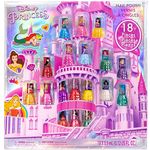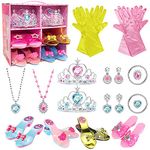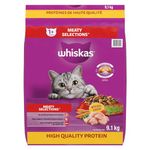8 bestCat Food For Kidney Diseaseof January 2026
112M consumers helped this year.
15% off
1
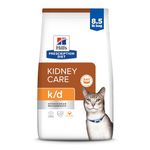
Hill's Prescription Diet k/d Kidney Care with Chicken Dry Cat Food, Veterinary Diet, 8.5 lb. Bag
HILL'S PRESCRIPTION DIET

9.8
2
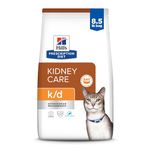
Hill's Prescription Diet k/d Kidney Care with Ocean Fish Dry Cat Food 8.5 lb
HILL'S PRESCRIPTION DIET

9.6
3
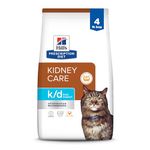
Hill's Prescription Diet k/d Early Support Kidney Care Chicken Flavor Dry Cat Food, Veterinary Diet, 4 lb. Bag
HILL'S PRESCRIPTION DIET

9.3
4
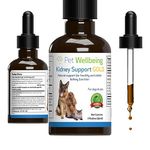
Pet Wellbeing Kidney Support Gold for Cats - Vet-Formulated - Supports Healthy Kidney Function in Cats - Natural Herbal Supplement 2 oz (59 ml)
Pet Wellbeing

9.1
5
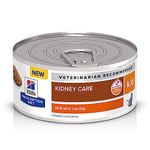
Hill'S Prescription Diet K/D Feline Renal Health - 24X5.5Oz
HILL'S PRESCRIPTION DIET

8.8
6
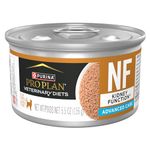
Purina Pro Plan Veterinary Diets 17903 Ppvd Nf Advn Care Feline Cat Food, 5.5 oz
Purina Pro Plan Veterinary Diets

8.6
7
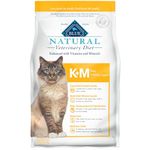
Kidney + Mobility Support for Cats 7lbs
Blue Buffalo Natural Veterinary Diet

8.3
8
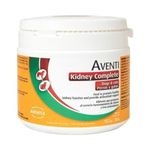
Aventi Kidney Complete 300g Powder for Dogs and Cats
Aventi

8.0
A Guide to Selecting the Best Cat Food For Kidney Disease
Choosing the right cat food for a cat with kidney disease is crucial for managing their health and improving their quality of life. Cats with kidney issues need special diets that help reduce the workload on their kidneys, control symptoms, and maintain proper nutrition. When shopping for cat food in this category, it's important to understand the key nutritional factors and how they impact your cat's condition. Always consult your veterinarian before making any changes to your cat's diet, as they can provide guidance tailored to your cat's specific needs.
Protein Content
Protein is an essential nutrient for cats, but in cases of kidney disease, the kidneys have trouble processing the waste products from protein breakdown. Cat foods for kidney disease typically have reduced protein levels to help lessen the strain on the kidneys. Low to moderate protein content is usually recommended, but it's important that the protein is high quality and easily digestible. If your cat is in the early stages of kidney disease, they may tolerate a bit more protein, while advanced cases often require stricter limits. Your vet can help determine the right balance for your cat.
Phosphorus Levels
Phosphorus is a mineral that can build up in the blood when the kidneys aren't working well, leading to further kidney damage. Cat foods designed for kidney disease have lower phosphorus content to help slow the progression of the disease. Look for foods labeled as 'low phosphorus' or check the nutritional information for phosphorus levels. Cats with more advanced kidney disease benefit from even lower phosphorus, so your cat's stage of illness will guide how strict you need to be with this nutrient.
Sodium Content
Sodium, or salt, can affect blood pressure and fluid balance, which are both important in cats with kidney disease. Foods for kidney health usually have reduced sodium to help prevent high blood pressure and reduce the risk of fluid retention. If your cat has additional heart or blood pressure issues, your vet may recommend even stricter sodium limits. Always check the label for sodium content and choose foods specifically formulated for kidney support.
Moisture Content
Cats with kidney disease are prone to dehydration because their kidneys can't conserve water as well. Wet or canned foods have higher moisture content, which helps keep your cat hydrated and supports kidney function. If your cat prefers dry food, you may need to encourage more water intake or mix in wet food. For most cats with kidney disease, wet food is the better choice, but your cat's eating habits and preferences should also be considered.
Palatability
Cats with kidney disease often have reduced appetites or become picky eaters. Palatability refers to how appealing the food is to your cat in terms of taste, smell, and texture. It's important to find a food your cat will actually eat, as maintaining proper nutrition is essential. If your cat refuses one type of food, try different flavors or textures, and consider warming the food slightly to enhance its aroma. Your cat's willingness to eat the food is just as important as the nutritional content.
Added Supplements
Some kidney-support cat foods include added supplements like omega-3 fatty acids, B vitamins, and antioxidants. These can help reduce inflammation, support overall health, and compensate for nutrients lost due to kidney disease. While these extras can be beneficial, they should not replace the core requirements of low protein, phosphorus, and sodium. If your cat has specific deficiencies or needs, your vet may recommend foods with certain supplements.
Best Reviews Guide Newsletter
Get exclusive articles, recommendations, shopping tips, and sales alerts
Sign up for our newsletter to receive weekly recommendations about seasonal and trendy products
Thank you for subscribing!
By submitting your email address you agree to our Terms and Conditions and Privacy Policy

